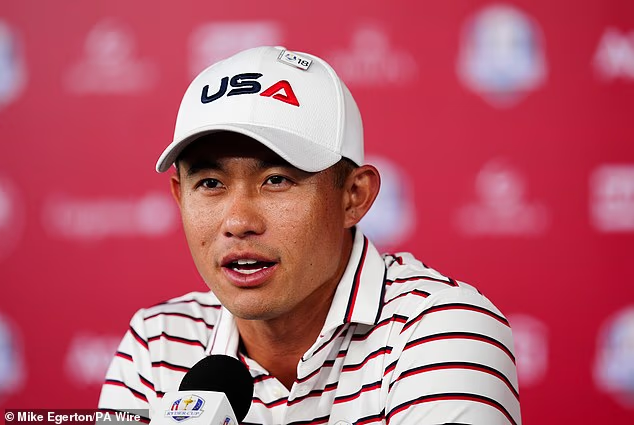Team USA: Embracing Passion Over Profit at the Ryder Cup
As the Ryder Cup approaches, the focus is shifting toward the motivations that drive Team USA. In a world where financial incentives often dominate sports narratives, Collin Morikawa challenges this perception, articulating that his team’s zest for competition emanates from a deeper emotional place. The notion that Team USA requires monetary compensation to compete, particularly the reported stipend of $200,000, has ignited significant debate. Is money truly the main incentive, or do the patriotic passions run deeper?
The Stir Around Stipends
Recent headlines have spotlighted the financial stipends awarded to Team USA for participating in the Ryder Cup. This $200,000 benefit has drawn mixed reactions, particularly from Team Europe. European captain Luke Donald astutely pointed out that the American players could face backlash from their home crowd if they fail to perform. With such high stakes, will this financial backing overshadow the players’ intrinsic motivation?
Morikawa’s Stand
Collin Morikawa, a pivotal member of Team USA and participating in his third Ryder Cup, has firmly rejected claims of needing payment to fuel their competitive spirit. "There’s no number," he insists when questioned about the stipend. His response underscores a fundamental truth amongst athletes: the love for the game surpasses financial compensation. Instead of focusing on the payout, Morikawa highlights the sheer desire to win—both for personal glory and national pride.
The Emotional Connection
The emotional weight of representing one’s country provides a unique motivation for athletes. Morikawa shares how experiences from team gatherings, including speeches from inspiring figures, have resonated deeply with the players. A recent address by a New York firefighter, Chris Mascali, who lost his father during the 9/11 attacks, encapsulated this ethos. It is moments like these that remind players why they compete and who they represent.
Team USA’s Unity
As Team USA gears up for the Ryder Cup, Captain Keegan Bradley has prioritized team unity and camaraderie. The team’s recent practice sessions not only serve to hone their skills but also to create lasting bonds. Mascali’s heartwarming speech, alongside his son, painted a vivid picture of honor and resilience, igniting a fire in the players. The group recognizes that this competition is about more than just golf; it’s about collective honor and shared values.
Housing History and Heritage
As a nod to their commitment, Team USA is paying tribute to fallen heroes by housing Joe Mascali’s helmet in their team room at Bethpage Black. This gesture speaks volumes about the team’s dedication to honoring the sacrifices made by those who serve. While they may earn stipends for their participation, it is clear that they hope to go beyond financial gain and channel their efforts toward something greater.
Charitable Contributions
Interestingly, the structure of the stipend also includes a charitable aspect that has captured the players’ interest. Each member of Team USA will receive $500,000, with $300,000 earmarked for a charity of their choosing. This creates an opportunity for players to make a meaningful impact beyond the green. The dual motivation of performance and philanthropy enhances their sense of purpose while competing at the highest levels of the sport.
A New Perspective on Payment
Controversy emerged around claims of player grievances regarding payment. Player Patrick Cantlay faced scrutiny from fans who perceived his actions as a refusal to embrace Team USA’s identity due to pay disputes. However, he later clarified that this was a misinterpretation. The essence of the discussions around stipends reflects deeper issues, such as recognition and financial equity in sports.
Recognizing Support Staff
Morikawa’s insights reveal a broader understanding of who benefits from financial arrangements in sports. The recognition of support teams behind the athletes is profound; many of these individuals work tirelessly but remain behind the scenes. By advocating for equitable compensation, the players emphasize their gratitude and acknowledgment of those who contribute to their success.
Giving Back to Communities
As Team USA prepares for the Ryder Cup, Morikawa highlights the collective aim of giving back. By donating their stipends to charity, the players express commitment to uplifting their communities. Sporting legends, after all, have a unique platform; they can influence social change and contribute to causes close to their hearts. The emphasis on philanthropy during such moments exemplifies a shift towards using sports as a medium for positive impact.
Looking Ahead to the Ryder Cup
As the tournament unfolds, the motivations driving Team USA remain clear—they are more than competitors; they are representatives of hope, passion, and resilience. While financial discussions may capture headlines, the core of their journey is about pride, honor, and unity. As they step onto the tee at Bethpage Black, they carry not just their bags, but the ambitions and legacies of the communities they cherish. The journey for the Ryder Cup is not merely a quest for victory; it’s a testament to the spirit of sportsmanship and humanity at its finest.
In conclusion, while the discussion around monetary aspects is significant, it is the emotional connections and shared goals that truly define Team USA’s approach to the Ryder Cup. They are fueled by more profound motivations than financial gain, embodying a spirit that resonates well beyond the golf course.


